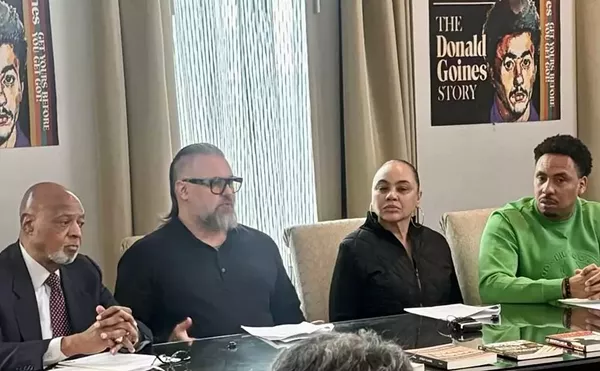Coincidence is a Rorschach test for that tender but tenacious part of our psyches which is forever interpreting things, holding out the possibility of meaning or emphasizing meaninglessness, our personal case histories determining what we see. Either some grand design is glimpsed or the fact that shit just happens is brought home once again.
It’s an approach that hasn’t quite lost its novelty appeal, though it’s right on the verge of doing so, and Thirteen Conversations may be the last film that’s able to use it with some effectiveness. Directed by Jill Sprecher and co-written with her sister Karen — the same team who gave us Clockwatchers (1997) — it’s a movie that’s drenched in mood, paced by portentous silences and lightly garnished by an unobtrusive score. The film is unabashedly pretentious, determined to bite off more than it can chew, sincere but, like Clockwatchers, leavened with dabs of acerbic humor. It’s "philosophical" without evincing any of the heavy lifting of genuine philosophy. This film’s insights are commonplaces and its ironies are heavy-handed. But it still has its moments.
The story threads are first offered as independent entities. Troy (Matthew McConaughey) is a hotshot young lawyer who luxuriates in his perfect happiness with such confident glee that you just know that his comeuppance will be swift and brutal. And it is.
Walker (John Turturro) is a discontentedly married college physics teacher whose sense of self is seeping away in the entropy of a midlife crisis. And one of the main characteristics of entropy, as he informs his students, is that it is "irreversible." He writes the word in large letters on the chalkboard. Later he’ll erase it as he enters into an affair with a fellow teacher (Barbara Sukowa).
Gene (Alan Arkin) is an insurance claims manager and permanent cynic. "Show me a happy man," he says, "and I’ll show you a disaster waiting to happen." Gene is bedeviled by one of his underlings at work, Wade (William Wise), an effortlessly amiable sort who sees the bright side of everything. Gene is determined to make Wade suffer, if only to get him in line with Gene’s worldview. The attempt backfires.
Beatrice (Clea DuVall) is a young girl from a modest background who has a job cleaning rich people’s apartments. Sweetly naive, her life is shattered when she becomes a victim of a hit-and-run accident. The driver of the car is Troy.
The common theme here is fate and temperament, the way an upending event does or doesn’t change one. Walker’s unhappiness arises from his self-absorption. He no longer emotionally connects to his wife (Amy Irving) and irrationally thinks that an extramarital affair will be the same thing as a new beginning. Only when his indifference has a disastrous effect on one of his students does he begin to realize how far gone he is. Troy and Beatrice’s encounter has swifter results, the lawyer immediately undone by guilt at having left the accident, the young girl quickly made bitter by being forced to confront life’s unfairness.
Gene’s story is richer and more subtle, thanks largely to Arkin’s performance. The actor is a past master at playing anxiously frustrated types, rational men who have been dealt too many bad hands. Gene’s attitude may be sour but it’s not delusional; his life really does suck. Divorced and with a teenage junkie son, he’s also in constant danger of being downsized. When his scheme to hurt the affable Wade at first seems successful, he’s overcome by guilt. But Wade is a holy fool who bounces back from everything and at the story’s end — which is also its beginning — Gene is still behind his cynical facade, suffering implacably.
Amid all these interlocking tales of transformation, it’s Gene’s emotional immobility that remains the one truly moving thing.
Opens Friday exclusively at the Main Art Theatre (118 N. Main, Royal Oak). Call 248-542-0180.






